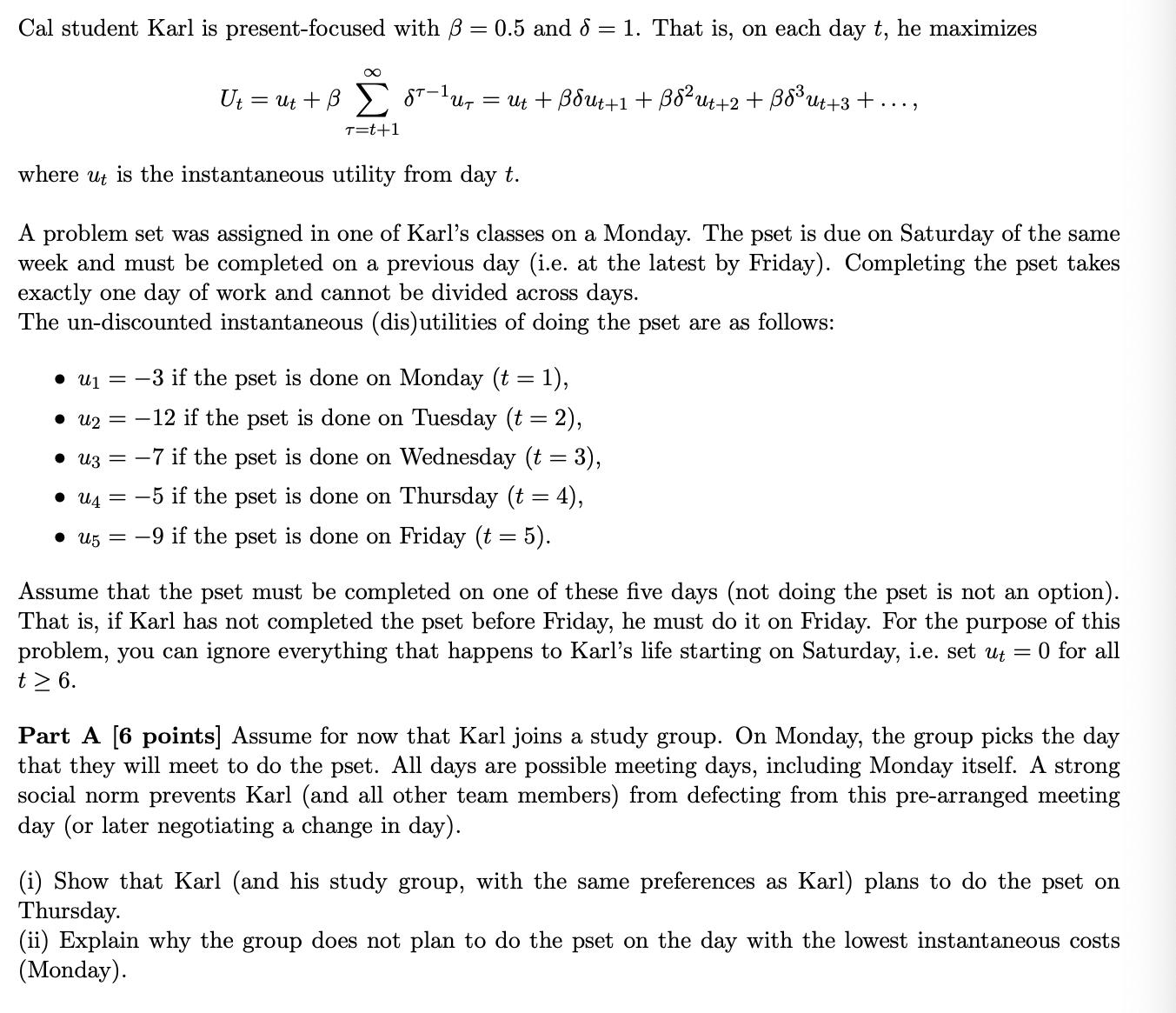Answered step by step
Verified Expert Solution
Question
1 Approved Answer
Cal student Karl is present-focused with B = 0.5 and 8 = 1. That is, on each day t, he maximizes Ut = ut



Cal student Karl is present-focused with B = 0.5 and 8 = 1. That is, on each day t, he maximizes Ut = ut + S-lur = ut + Sut+1 + 8 ut+2 + 8 ut+3 + ..., T=t+1 where ut is the instantaneous utility from day t. A problem set was assigned in one of Karl's classes on a Monday. The pset is due on Saturday of the same week and must be completed on a previous day (i.e. at the latest by Friday). Completing the pset takes exactly one day of work and cannot be divided across days. The un-discounted instantaneous (dis) utilities of doing the pset are as follows: u = -3 if the pset is done on Monday (t = 1), u2 = -12 if the pset is done on Tuesday (t = 2), u3 = -7 if the pset is done on Wednesday (t = 3), u4-5 if the pset is done on Thursday (t = 4), u5 = -9 if the pset is done on Friday (t = 5). Assume that the pset must be completed on one of these five days (not doing the pset is not an option). That is, if Karl has not completed the pset before Friday, he must do it on Friday. For the purpose of this problem, you can ignore everything that happens to Karl's life starting on Saturday, i.e. set ut t > 6. = 0 for all Part A [6 points] Assume for now that Karl joins a study group. On Monday, the group picks the day that they will meet to do the pset. All days are possible meeting days, including Monday itself. A strong social norm prevents Karl (and all other team members) from defecting from this pre-arranged meeting day (or later negotiating a change in day). (i) Show that Karl (and his study group, with the same preferences as Karl) plans to do the pset on Thursday. (ii) Explain why the group does not plan to do the pset on the day with the lowest instantaneous costs (Monday). Part B [10 points] Now assume that Karl has no study group and simply decides each day whether he will do the pset on that day. Moreover, assume that Karl is fully naive, i.e. = 1. Be sure your answer addresses the following items: (i) When does Karl's Monday self expect to do the pset? (ii) When does Karl's Tuesday self expect to do the pset (if not already done before Tuesday)? (iii) When does Karl's Wednesday self expect to do the pset (if not already done before Wednesday)? (iv) When does Karl's Thursday self expect to do the pset (if not already done before Thursday)? (v) Combining all of this information, when will naive Karl (without a study group) actually complete the pset? Part C [10 points] Continue to assume that Karl has no study group. But now assume that Karl is fully sophisticated, i.e. B = 0.5. Recall that if the pset has not been completed before Friday, it must be - done on Friday. Be sure your answer addresses the following items: (i) If not completed before Thursday, will Karl do the pset on Thursday? (ii) If not completed before Wednesday, will Karl do the pset on Wednesday? (iii) If not completed before Tuesday, will Karl do the pset on Tuesday? (iv) Will the pset be completed on Monday? (v) Combining all of this information, when will fully sophisticated Karl (without a study group) actually complete the pset?
Step by Step Solution
There are 3 Steps involved in it
Step: 1

Get Instant Access to Expert-Tailored Solutions
See step-by-step solutions with expert insights and AI powered tools for academic success
Step: 2

Step: 3

Ace Your Homework with AI
Get the answers you need in no time with our AI-driven, step-by-step assistance
Get Started


